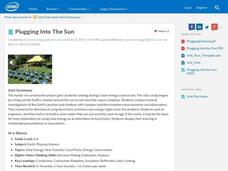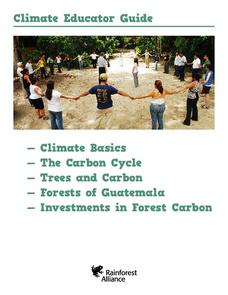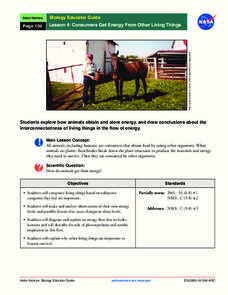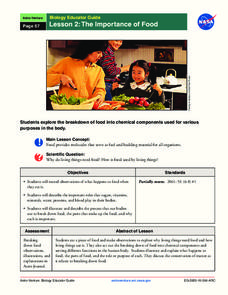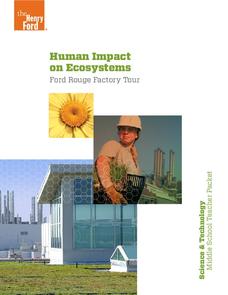Towson University
Mystery of the Crooked Cell
Can your class solve the Mystery of the Crooked Cell? Junior geneticists collaborate to learn about sickle cell anemia in a fascinating lesson plan. The included materials help them to examine the genetic factors behind the disease...
American Physiological Society
Hoo Eats Who and What is What in Your Own Backyard?
Bird is the word! Teach life science scholars the importance of our feathered friends and the roles they play in our ecosystem. Using the plan, learners investigate the birds in their areas, determine the biotic and abiotic factors that...
Columbus City Schools
You Can’t Sneeze On This Tissue
Take your class' understanding of cells to the next level... or levels! Demonstrate the levels of organization using a variety of engaging methods. The teacher's guide includes the materials you'll need to execute a flower dissection,...
Columbus City Schools
Cell-abrate!
Lights, camera, action! With the cell at center stage, guide your seventh grade biologists through the tiny drama that plays out within every living thing. Then, enjoy the show as they portray the organelles they've studied—a performance...
Intel
Plugging into the Sun
What's cooking? A sizzling STEM unit challenges scholars to build a solar cooker that can successfully cook an egg. The unit opens with a study of Earth's rotation, the sun's energy, and shadows. Pupils use a compass and thermometer to...
Intel
Insects: The Good, The Bad, The Ugly
What would the world be like with no insects? Ponder this question using a research-based STEM unit that encourages scholars to investigate insects from both a beneficial and hazardous perspective. They learn about insect behaviors,...
PhET
Radioactive Dating Game
Uranium 235 has a half-life of over 700 million years and is the fuel used in the atomic bomb dropped on Hiroshima, Japan. Pupils see the half-lives and decay rates of Carbon-14 and Uranium-238. They also take measurements of these two...
Rochester Institute of Technology
Biomechanical Joint
Discuss mechanical advantage and how the human body moves/works. Learners focus on bioengineering, working together to build a functioning mechanical arm. Additionally, they analyze an air muscle, discussing its appropriate use in humans.
Rainforest Alliance
Climate Educator Guide
Climate change is a hot topic in the news. Class members examine carbon dioxide data to analyze trends of our atmospheric makeup over time. They also discuss climate and climate change, and determine how these changes are affecting life...
Rochester Institute of Technology
Artificial Lung and Diaphragm
She had a terribly busy day converting oxygen into carbon dioxide; now she just needs a moment to breathe. In the activity, scholars review the function of the respiratory system and discuss bioengineering's role in medicine/health and...
NASA
Producers Make Their Own Food
During an inquiry-based activity, scholars decide which variable to test and then design an experiment to determine the needs of producers. After two weeks, they complete a full analysis and research paper.
Omaha Zoo
Monitoring Amphibians
What sort of shoes do frogs wear? Open toad sandals. If your scholars want experience collecting field samples, this is the lesson for you. After learning the proper way to collect field samples, pupils catch amphibians to test for...
Curated OER
Sustainability and Extinction
Galapagos Penguins are the only penguins on earth that live north of the equator (in the wild). In this last lesson plan a discussion on how the Galapagos islands developed their populations and diversity sparks the introduction. Two...
Curated OER
Hedgerows
Hedgerows prevent soil erosion, capture pollutants running off fields, store carbon to help combat climate change, and provide homes for predators of many pest species. The biodiversity lesson begins with an activity that discusses why...
Curated OER
Artificial Selection
The second lesson in the series begins with a starter activity discussing wild versus domesticated animals. Then, scholars play a card game, with optional variations, to emphasize artificial selection. Next, they attend a field trip to a...
Curated OER
Darwin’s Bees
What do you call a bee born in May? A maybe! This first instructional activity in a series of four begins with a starter activity to get scholars thinking about the topic. Then a circus, or circuit of seven activities, show Darwin's...
NASA
Biology Training Conclusion
Gravity is just one consideration when determining human habitability on a new planet. The lesson connects four different units and starts with connecting the various systems: planetary systems, human body systems, etc. After scholars...
NASA
Consumers Get Energy From Other Living Things
How do plants and animals get their food? Learn about where energy comes from, how animals store energy, and aerobic respiration, in a instructional activity that allows scholars to diagram energy flows.
NASA
The Importance of Food
Pupils make observations while eating food. They act out the process of food breaking down in the body and the roles of various chemical components, such as sugar and protein. It concludes with an activity illustrating the process and a...
NASA
Biology Training Module
Are you a koalafied biologist? The lesson begins with research about human survival and our ecosystem. Then, an online training module simulates the effects of changes to the plants and animals in an ecosystem. Finally, scholars research...
Henry Ford Museum
Human Impact on Ecosystems
An environmenta science unit includes three lessons plus a cumulative project covering the ecosystem. Scholars follow the history of the Ford Rouge Factory from its construction on wetlands and how it destroyed the environment to its...
Chemical Education Foundation
Teacher's Guide to Science Projects
Do you find the idea of having a science fair with all of your students intimidating? Use a guide that provides everything you need to know to make project-based learning manageable. The resource includes options for four different types...
PricewaterhouseCoopers
Waste and Recycling: Recycling and Energy Recovery
Reduce, reuse, recycle, and recover. Young environmentalists learn about the overwhelming amount of garbage produced and discover better ways to minimize their impact on Earth by learning the difference between garbage and recyclables.
Water
Global Water Supply Middle School Curriculum
We take a steady shower stream and clean drinking water for granted, but in many countries around the world, the lack of water or a clean water supply is responsible for higher sickness and death rates. Taking a closer look at the water...






